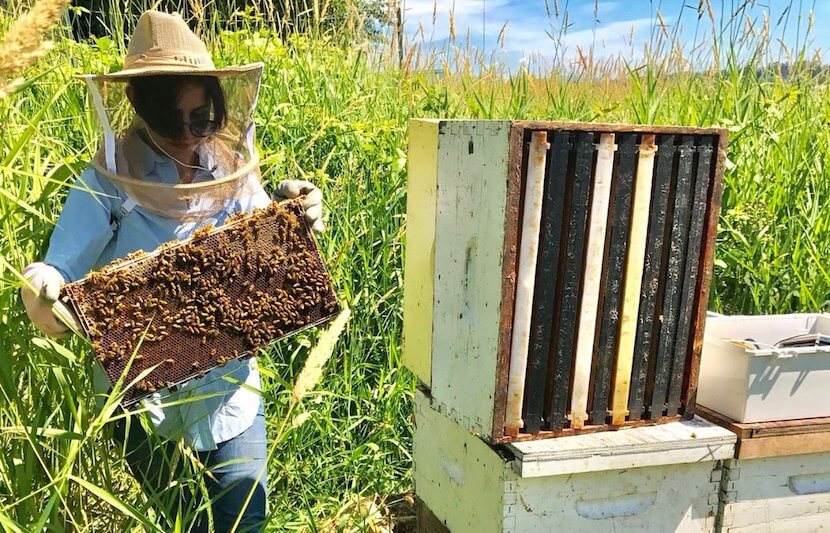Ever wonder what honeybees are saying to each other as they buzz busily around their hive? You won’t have to wonder for long. Oldooz Pooynfar, a graduate student at Simon Fraser University (SFU) in British Columbia, Canada, has devised a new technology that aims to find out exactly what the honeybees are communicating to each other, and how it can help us learn more about their health.
Pooynfar is a student at SFU’s School of Mechatronic Systems Engineering, and works as a research assistant. She has developed a beehive monitoring system that operates from inside the beehive where the platform’s tiny sensors, which contain microphones and accelerometers, monitor all sound and vibration activity around them. The high-tech system has been in use all summer, helping to gather valuable data.
The technology’s features don’t stop at sound, though. The platform also records the temperature and humidity of the perspective hive and allows for data on the sound to be collected. This system lets beekeepers provide a quick response to any abnormalities that are detected in the honeybees’ activity.
It would certainly seem that the time is ripe for technology advances such as these. The past decade has seen honeybee population in North America fall by a shocking 30%. This “Colony Collapse Disorder” has sent ripples of alarm through the scientific community, prompting minds such as Pooynfar to take action. She believes that having knowledge of activity among honeybees is critical for helping humans understand how we can help the species stay healthy and prevent their numbers from declining further.
Pooynfar spoke to The University Network (TUN) about her work and discussed the challenges she faced. “As an engineer, I had to gain insight into the lives of the bees” she said. “The honeybees are indeed a complex community, and I still have a lot to learn about them. But entering from an engineer’s perspective, to solve the problem, I also had to understand what the challenges that beekeepers face are and what are the requirements.”
The complexities went far deeper than just the honeybees, though. Pooynfar went on to describe the technology in further detail. “I had to pinpoint the data that is definitive in recognizing the bee behaviour patterns” she told TUN. “Utilizing the literature and research on honeybee colonies, I narrowed down the sensors and data collection methods. The sensor installation in the hive, providing power supply for the equipment, accessing remote locations, and valid data collections are some of the challenges that I have had as a researcher so far. The challenges have been numerous and there is still a long way to go. But I do believe once the prototype is available and is utilized on a larger scale, it can provide a good feedback on the lives and the health of the honeybees.”
The extensive process of developing this platform and conducting the research based upon its results has been a learning experience for Pooynfar. She hopes to further develop the technology in the future, so she can collect more data. “We hope to move to producing a reliable data acquisition system, that is easy to install and maintain and can be available to any beekeeper,” she said. “It is essential for us to have as much data as possible to achieve a better understanding of the lives and activities on the honeybee colonies.”
Pyoonfar believes honeybee health is key to the environment, and is committed to the cause. “We have to step back and pay closer attention to what is sustaining our environment, and honeybees play an important part in that,” she said. “I hope that I can do enough on my part in keeping an eye on our planet’s health and survival through honeybees.”



